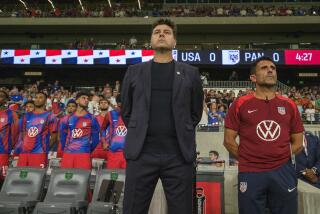U.S. Gets in a World of Trouble
- Share via
GELSENKIRCHEN, Germany — For a decade or more, the United States has been preaching that it is ready to play the world’s game with the world’s elite.
A surprising quarterfinal finish by the U.S. soccer team at the 2002 World Cup boosted that notion. So did the growing flow of top American players to European club teams.
But Monday’s 2006 World Cup opener for the U.S. -- in front of a sellout crowd of more than 52,000 -- burst that bubble as the Czech Republic defeated the Americans, 3-0. The loss left the U.S. on the brink of elimination after only one game.
If it is defeated by Italy on Saturday, the U.S. will almost certainly be out of the 32-nation tournament that transfixes the sporting globe every four years. The scary thing for Coach Bruce Arena and his team is that Italy has players every bit as good as the Czechs, perhaps even better.
The U.S. put its finest possible starting lineup on the field Monday evening, with eight starters who play on European teams. Two of the three who do not, Landon Donovan and Eddie Johnson, earn close to $1 million a year in Major League Soccer.
Yet, the gulf in class was clear.
The opening goal, a header by 6-foot-8 Jan Koller, set the stage as early as the fifth minute. And Pavel Nedved, the Czech Republic’s playmaker, toyed with the American defenders throughout the game, bedazzling them with his footwork, his passes, his speed of thought and play.
Nedved was not alone in lighting up Monday’s game. Tomas Rosicky scored two goals, both on long-range shots after the defense had failed to close him down.
“It was certainly a very poor start to the game,” Arena said. “We were really behind the eight ball from the start.”
The U.S. players were slow by comparison to their Czech counterparts, and the type of fire usually shown by Donovan, DaMarcus Beasley, Brian McBride and Bobby Convey was strangely absent.
It was almost as if the U.S. was intimidated, a quality the team has often displayed in Europe.
Claudio Reyna, the team’s captain and one of the few American players to perform well, hit the left goal post with a shot when the score was still 1-0. Had that ball gone in, things might have been different.
“I’m very disappointed in the performance of a number of our players,” Arena said. “The better team won today.... They punished us for every mistake we made.”
The U.S. appeared shell-shocked. The achievement of 2002 was supposed to have erased the memories of a last-place finish at the France ’98 World Cup. Now, there are fears that that misery might be repeated.
Even the untrained eye can see one reason why.
The majority of America’s best athletes, with a few notable exceptions, continue to head for the NFL, the NBA and Major League Baseball. The stage might be smaller, but the financial rewards are far greater. Soccer gets the second-tier athletes.
The Czech team featured taller, older, more powerful players at virtually every position. Soccer is not about size and weight, of course, but when size and weight are combined with technical and tactical skills, the U.S. is at a disadvantage.
That is changing, but it will take a few more decades to turn around completely. Meanwhile, when the U.S. comes up against the best of Europe, the best of America cannot compete.
The current wave of enthusiasm in the U.S. for the World Cup dates to 1990, when the Americans made their first appearance since 1950 in the tournament, only to lose all three games, including a 5-1 loss to Czechoslovakia in its opener.
After the strong showing of the U.S. team in the 2002 World Cup, and years of tournament play together by its young players, including Donovan, Beasley and Convey, there was hope this team would advance deep into this year’s tournament.
The misconception has been furthered by the FIFA rankings, published monthly by soccer’s Switzerland-based international governing body, but viewed by players, coaches and the media alike as little more than a marketing ploy.
In the current rankings, the Czech Republic is ranked second behind Brazil, and the U.S. is ranked fifth.
The U.S. might have progressed enough to legitimately match Mexico as a soccer power within the North and Central American and Caribbean region, but it is far from imposing itself on the global game.
It is a top-20 team, yes, but it doesn’t belong in the top 10.
The truth is that although the sport is growing in America, although MLS stadiums are springing up like mushrooms and attendance at soccer matches inches ever upward, on the field itself American players still struggle.
Arena said he thought Monday that only Reyna, Convey and Oguchi Onyewu played to anywhere near their ability. “Everybody else, the performances weren’t good,” he said.
In a rare display of anger at certain players, he pointed to their individual shortcomings. “We got nothing out of Beasley on the night,” he said, adding that Donovan “showed no aggressiveness” and that “not enough players showed initiative.”
“We have five days to get it right” before the game against Italy, Reyna said.
But the loss Monday was a bitter one.
Said Donovan, the U.S. team’s biggest star: “You just have to put yourselves in the right spots, and we didn’t do that. I didn’t do that. We were just a little disjointed.”






